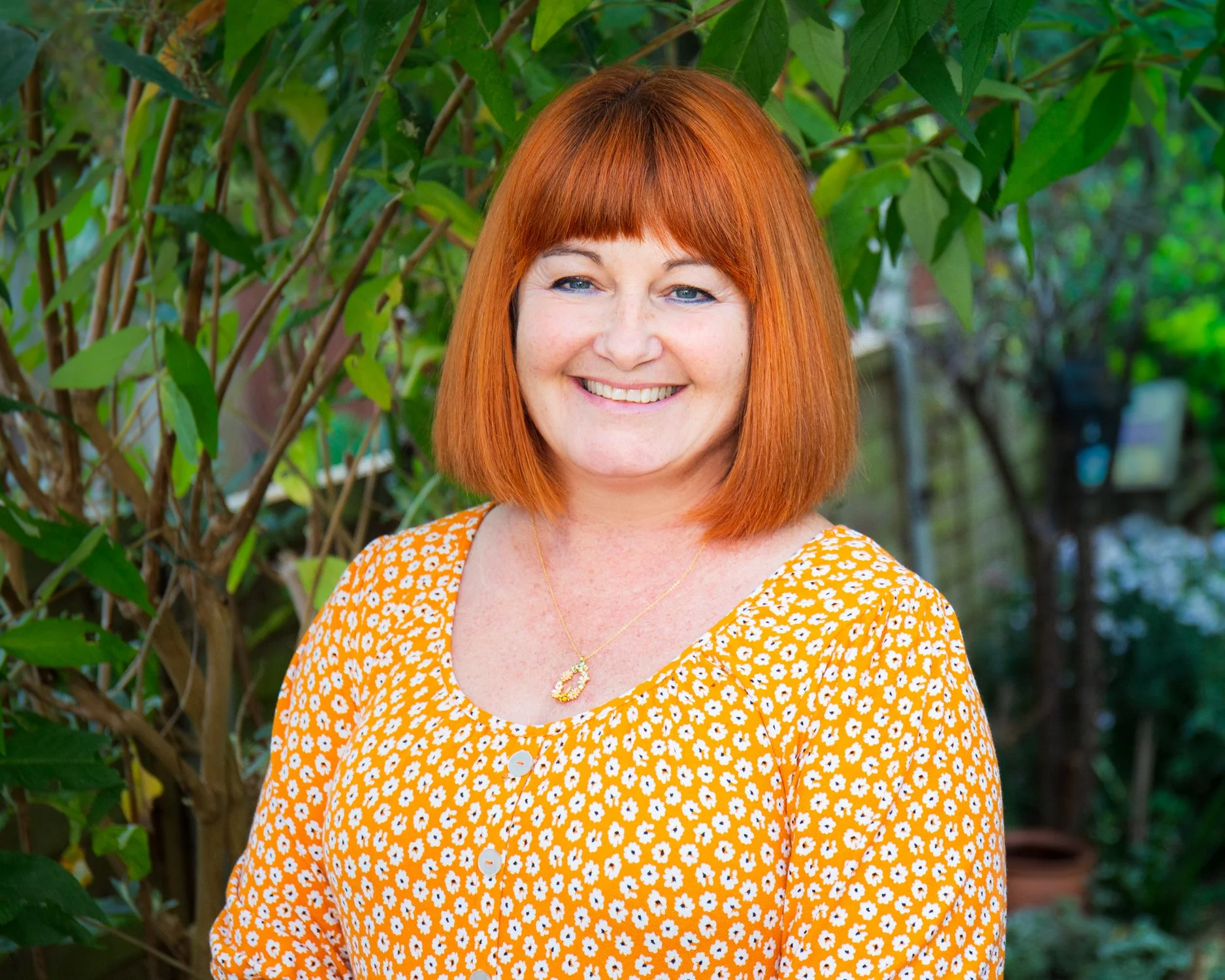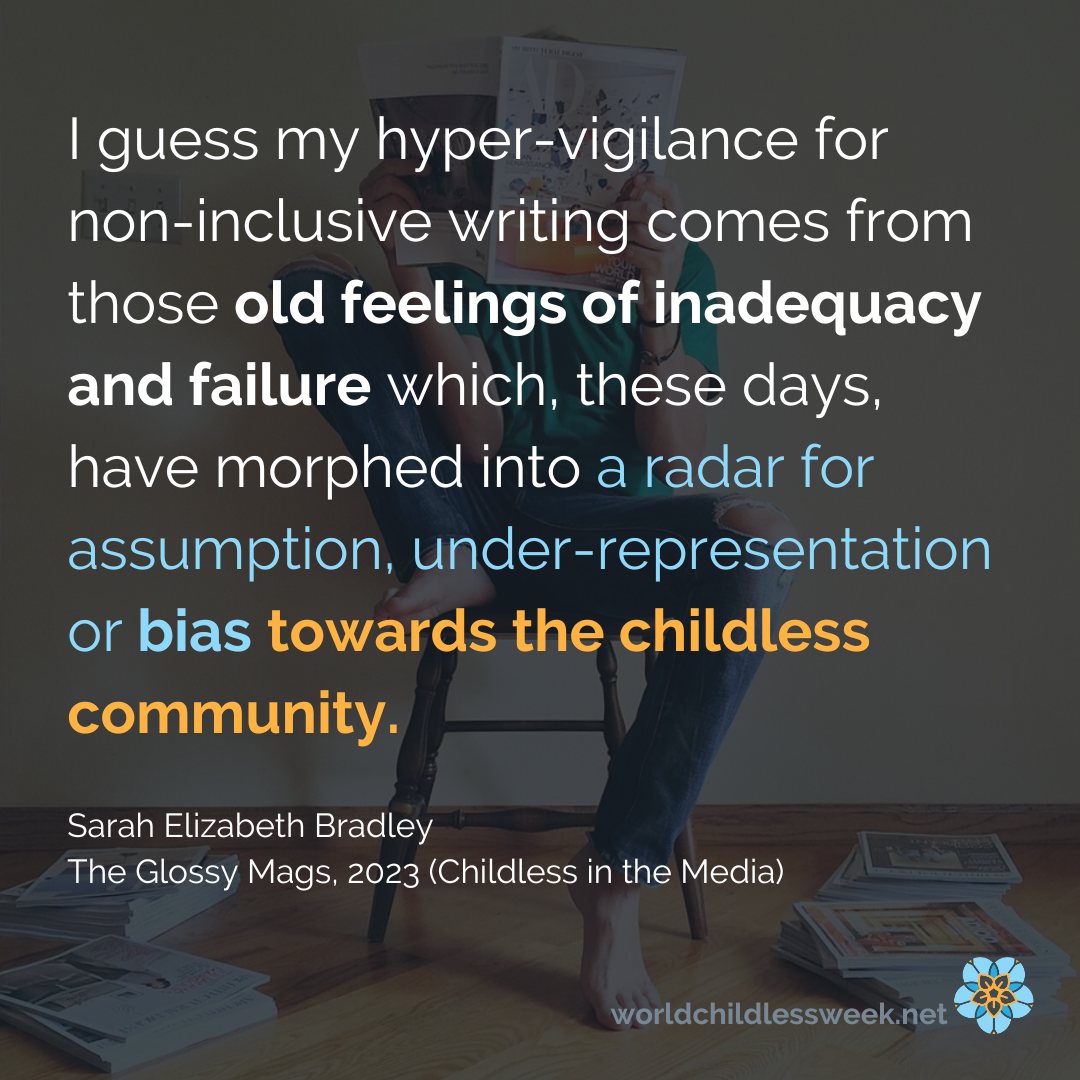Sarah Elizabeth Bradley
Childlessness in the media. Where to start?!
Well, I love a glossy magazine, so I’ll start there.
Firstly, let’s be clear, I don’t expect the media in any shape or form to never mention people who have children. Neither do I expect people who have children to never mention them in the media. So, when I’m leafing contentedly through one of my magazines, (I subscribe to 3 titles which represents a cutback due to cost-of-living increases!) I don’t find myself getting upset or angry or even mildly irritated at the mention of children or babies or parents or mums.
What I am aware of, however, is giving a small, silent cheer if I get to the end of an article about any woman, without knowing whether or not she has kids. Because there is a recognition that in most situations, a woman’s achievements, opinions or anything interesting about her, have nothing to do with whether or not she has produced offspring.
The opposite of the small, silent cheer is the audible “Oh FFS!” when I’m reading a piece about a woman who has something worthwhile to report, only for it to be tagged with “Mum of three…” or “busy Mum…” A recent example of this was in my much-loved Psychologies Magazine, which has a regular column by Pilates Teacher and Mum of Two, Rachel Hurd-Wood. Her column is about yoga and Pilates. She doesn’t write about her children, so why include them in her byline?
This got me looking out for more examples of the dreaded pro-natalism in my magazines.
I’m ok with “You probably come with lots of life experience and possibly children.” No assumption that all of us are parents.
Contrast this with “We spend life rushing between work and looking after our family.” Well, I don’t; unless you count changing out of my PJs before I log into Zoom and feeding the cats, so they don’t interrupt my online appointment. It’s the “We” that is the problem because it immediately excludes those of us that don’t have children.
If I’m being generous, I could give the writer the benefit of the doubt as to what she means by “family.” But I think we all know, don’t we, that when any arm of the media uses the F word they are talking about parents and children. I’m more comfortable, relieved even, when my magazines talk about Relationships rather than Families, making the content more inclusive and relatable for all readers.
I always approach articles about “Overwhelm” or “Responsibility” with caution as well. So often children are cited as a source of stress or a drain on time for the Busy Mum, like the childless reader has no concept of busyness. (What we would have given, by the way, to have experienced the busyness of parenthood.)
On the other hand, I have no problem with an article in my latest Good Housekeeping, headlined “Running the London Marathon brought me closer to my daughter.” The piece is about a challenge they both took on and the impact it had on their relationship – and well done to them. I’m ok with people having kids and reading about something interesting they have done together.
I guess my hyper-vigilance for non-inclusive writing comes from those old feelings of inadequacy and failure which, these days, have morphed into a radar for assumption, under-representation or bias towards the childless community.
The crassest example of the above came in a small feature on the News page of a recent Psychologies Magazine. The piece was about the need for workplace legislation around women having fertility treatment or dealing with pregnancy loss. All well and good you would think, to be raising awareness of these workplace equality issues. I was about to give a small silent cheer, when I saw that accompanying the text was a picture of a heavily pregnant woman cradling her bump. Oh FFS! Not only was this an incredibly hurtful image given the content of the piece, but it also gave the impression that fertility journeys always have a happy ending.
The juxtaposition of such insensitivity in the same issue as a cover feature on Elizabeth Day was beyond ironic! Day talks about her devastation at reaching what she sees as the end of twelve years of unsuccessful fertility treatment and the importance of friends. It’s a wonderful, moving feature, with too many pearls of wisdom for me to quote. Elizabeth Day is my Number One Childless Hero. She puts herself out there in the media, as an advocate for the childless community. Words like “simply because you have to let a dream go, it does not make you yourself a failure” are truly inspirational.
There must be more eloquent childless role models out there, so let’s hope we can start hearing from them more often.
Photo by WOKANDAPIX on Pixabay


